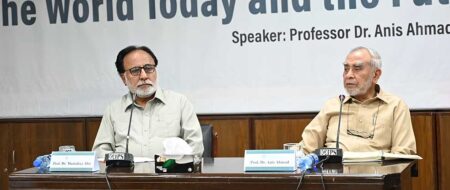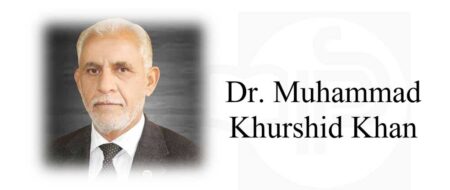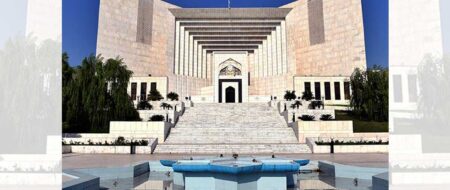US Policy Toward Israel and Palestine Under the Trump Administration
President Trump’s policy toward the Middle East
During Trump’s first tenure as the US President, he attempted to redraw the boundaries between Israel and Palestine in violation of the Oslo Accords. He asked Palestine to compromise on a much smaller share of land in the West Bank. His policy was overtly pro-Israel. While Israel agreed to the proposed plan, Mahmud Abbas refused to accept.[1] During his 2025 election campaign, his body language was once again pro-Israel. Immediately after winning the election, he warned that Hamas must settle the issues of hostages before his entrance into the While House. In his policy statement on the Palestinian issue, he stunned everyone, including his European allies. He declared that Palestinians from the Gaza Strip should be moved out of the Strip and settled in neighboring Arab countries.[2]
Trump’s victory was considered a sign of improved security for Israel by the Israeli leadership. On winning the election, Trump boasted that he is “the best friend that Israel has ever had.” As stated by Uri Friedman, on his record as president, that includes “imposing a ‘maximum pressure’ campaign on Iran, recognizing Jerusalem as Israel’s capital, and negotiating the Abraham Accords, whereby several Arab countries normalized diplomatic relations with Israel”, Trump administration proved that the US continues to be genuine friend of Israel.[3] Trump also hinted that he would complete the incomplete work of expanding the Abraham Accords. Accordingly, he has already asked Saudi Arabia during his last visit to conclude the accords and recognize Israel at their discretion.[4]
The Arab League’s reconstruction plan for the Gaza Strip
Meanwhile, the Arab League has endorsed the post-war Gaza reconstruction plan under the Palestinian Authority and opposed Trump’s displacement plan announced in February 2025, which was also staunchly rebuffed by the regional states. Trump’s call for Palestinians to be permanently removed from Gaza, and for the development of the territory into a “Riviera” resort, was also opposed by the international community, including America’s Western allies.[5] The Arab League’s five-year reconstruction plan, worth $53 billion, is also considered the Arab and Muslim Plan. The Arab leaders have agreed to establish a trust to finance the Gaza reconstruction plan, urging international contributions to speed up the rebuilding process. Since assuming office, Syria’s interim President Ahmed al-Sharaa also participated in the Arab summit held in Cairo.[6]
Several non-Arab figures also attended the summit. European Council President António Costa reaffirmed the EU’s commitment to Gaza’s reconstruction, while rejecting any demographic changes that could displace Palestinians. Costa stressed that all rebuilding efforts must respect Palestinian rights and uphold Gaza’s status as an integral part of a future Palestinian state. France, Germany, Italy, and the UK supported the Arab plan.[7] The plan envisions Gaza evolving into a city with all facilities, such as housing to accommodate up to three million Palestinians by 2030, powered by renewable energy, and development zones tailored to industry, agriculture, education, and tourism. The plan also aims to create 500,000 jobs across key sectors.
The Gaza reconstruction plan has been duly endorsed by the Organisation of Islamic Cooperation (OIC) during its meeting held on March 7, 2025, at Jeddah. The OIC “firmly rejected and condemned plans aimed at the displacement of the Palestinian people, whether individually or collectively, within their land or outside, or any form of forced displacement, exile, or deportation under any circumstances or pretext.” The forum once again “reaffirmed its commitment to a just, lasting, and comprehensive peace in the Middle East as a strategic option, based on the full withdrawal of Israeli occupation forces from all Palestinian territories occupied since 1967, including Gaza, the West Bank, and East Jerusalem.”[8]
Though the world community, including America’s close allies, rejected Trump’s idea, his statement was a great source of encouragement for Israel, which is now adamant to occupy the Gaza Strip for an indefinite period. Israel’s Cabinet has already approved the plan and asked reservists to report to the declared camps to participate in the planned operation to occupy the Strip. This move has once again shaken over 2.3 million Palestinians who will have no place on earth to settle themselves.
Trump’s recent Middle East visit and its outcome
Against the backdrop of Trump’s visit to the Middle East, one could argue that it was a profound disappointment for the people of Gaza. His statement, “The people of Gaza deserve a much better future,” while seemingly optimistic, was laden with ambiguity and conditional undertones.[9] The GCC, led by Saudi Arabia, was unable to convince Trump to take a more balanced and just stance on Gaza, ultimately enabling the Israeli PM to advance his planned strategy. Instead, while extending a warm welcome to Trump, Saudi Arabia, Qatar, and the UAE decided to dole out worth trillions of dollars to support the US economy. Saudi leadership pledged to invest $600 billion, besides signing the largest defense sales agreement in history, amounting to nearly $142 billion from American defense firms.[10]
Meanwhile, Qatar and the UAE also committed billions of dollars in business and defense deals to please Trump, the least one can say. Qatar pledged $42 billion toward defense-related technology, including remotely piloted aircraft systems and counter-drone capabilities from the US, laying the groundwork for a bigger $1.2 trillion economic pledge by the tiny Gulf country. The UAE announced a $1.4 trillion investment in the artificial intelligence sector over the next decade. Additionally, the UAE leadership unveiled plans for long-term investments totaling $10 trillion across various high-growth sectors, including technology, business, and military advancements.[11]
The primary issue anticipated for discussion between the GCC leadership and the Trump administration was the situation in Palestine. Many believed that the Saudi leadership was well-positioned to negotiate a balanced deal by incorporating Gaza into the discussions and persuading Trump to uphold the US’s longstanding commitment to a two-state solution to the Israel-Palestine conflict. Saudi Arabia could have presented the Arab League’s post-war Gaza reconstruction plan, under the Palestinian Authority, for Trump’s endorsement and participation. However, from Trump’s displayed behavior, one may conclude that during his Middle East visit, he was keener to focus more on confronting Iran and broadening Israeli-Arab diplomatic normalization than on resolving the Israeli-Palestinian conflict.
At this stage, even America’s closest Western allies, including the UK and France, were ready to support Saudi initiatives. However, despite securing everything on his agenda from Saudi Arabia, Qatar, and the UAE, Trump offered nothing in return to foster long-term peace and stability in the Middle East. By finalizing a historic weapons deal without making a sincere attempt to resolve the Palestinian issue, Saudi Arabia has tarnished its image among its eastern neighbors, including Iraq and Iran.
Nevertheless, one can only hope that the Saudi-led Middle East leadership is actively engaged with the US through discreet diplomatic channels to address the pressing issue of Palestine before moving forward with ambitious economic initiatives to enhance the US economic growth. A concerted diplomatic effort by the Saudi-led leadership remains essential in fostering lasting peace and mutual prosperity.
It is opined that there was little reason to celebrate Trump’s decision to lift sanctions on Syria, viewing it as a calculated symbolic gesture by the US rather than a genuine effort to assist the country. The US move is believed to have been aimed at asserting American influence over Syria. Had the US not stepped in, another power would have inevitably filled the void, allowing Syria to remain within Russia’s sphere of influence; it was merely a matter of time. Moreover, a swift resolution to the Russia-Ukraine conflict could have allowed Russia to re-engage with Syria, positioning itself as an ally to the current Syrian regime.[12]
Trump has steadily retreated from his previously stated position on Gaza, with even his close associates avoiding commentary on his policy statement and distancing themselves from his stance on the fate of the Palestinian people.[13] However, regardless of the current perspective of the Trump administration, the prevailing realities suggest that under his leadership, the US’s principled stance on the Israel-Palestine conflict is deteriorating, further deepening the suffering of the Palestinian population. The situation in the occupied West Bank is equally dire, with little hope for relief in the immediate future.
Conclusion
While America cannot change the historical legacies on its own, yet, Trump’s decision and wholehearted support for Israel would further delay the process of the settlement of the Israel-Palestine conflict. Mahmoud Abbas, the Head of the Palestinian Authority, also holds limited influence over regional affairs. In the absence of strong support from the Arab and Muslim world, the Palestinian people may face a prolonged struggle to secure freedom for future generations. Nevertheless, despite immense challenges, over seven million Palestinians remain resolute in their resistance against Israel’s occupation. They are expected to continue their steadfast efforts in the years ahead, causing serious challenges for regional peace and economic prosperity. Hence, the wisdom warrants that the key stakeholders, led by the US, should take a lead role and help Israel and Palestine to resolve their long-standing territorial disputes based on the 1967 UN formula of the ‘two-state solution’ in their common interest and the interest of the Mideast region at large.
Dr. Muhammad Khurshid Khan SI (M) is a retired brigadier of the Pakistan Army and a fellow at the Stimson Center, Washington, D.C. He holds an MSc in Defence and Strategic Studies from QAU, Islamabad, and a PhD in IR from NDU, Islamabad. He served for five years in the Strategic Plans Division (SPD) in the Arms Control and Disarmament Affairs (ACDA) Directorate, and for three years at ISSRA, NDU, in multiple leadership roles. He has authored numerous works on national and strategic affairs.
[1] Tania Krämer, “What does Trump’s win mean for the Israel-Hamas conflict?” DW, August 11, 2024, accessed November 8, 2025, https://www.dw.com/en/what-does-trumps-win-mean-for-the-israel-hamas-conflict/a-70727902.
[2] Aamar Madhani and Zeke Miller, “With Gaza rehab and other global policy ideas, Trump goes from America First to America Everywhere,” The Associated Press, February 5, 2025; Kramer, “What does Trump’s win mean for the Israel-Hamas conflict?”; Sarah Harvey, “What Donald Trump said on Gaza – his statement in full,” Independent, February 5, 2025.
[3] Uri Friedman, “What Would a Second Trump Administration Mean for the Middle East?” The Atlantic, October 21, 2024, accessed May 8, 2025, https://www.theatlantic.com/international/archive/2024/10/trump-middle-east-policy-israel/680289/; “A Comprehensive Overview of Donald Trump’s Foreign Policy: Key Actions and Controversies,” CEO Today, January 21, 2025, accessed May 8, 2025, https://www.ceotodaymagazine.com/2025/01/a-comprehensive-overview-of-donald-trumps-foreign-policy-key-actions-and-controversies/; Umar A Farooq, “Where does Donald Trump stand on Israel, Palestine, and the Middle East?” Middle East Eye, November 5, 2024, accessed May 8, 2025, https://www.middleeasteye.net/news/donald-trump-middle-east-foreign-policy.
[4] Madhani and Miller, “With Gaza rehab and other global policy ideas, Trump goes from America First to America Everywhere”; Kramer, “What does Trump’s win mean for the Israel-Hamas conflict?”; Sarah Harvey, “What Donald Trump said on Gaza – his statement in full.”
[5] Madhani and Miller, “With Gaza rehab and other global policy ideas, Trump goes from America First to America Everywhere.”
[6] “Egypt’s Gaza Reconstruction Plan ‘Approved’ by Arab Leaders,” Egyptian Streets, March 4, 2025; “Arab leaders in Cairo endorse Egypt plan for post-war Gaza,” New Arab, March 4, 2025; Madhani and Miller, “With Gaza rehab and other global policy ideas, Trump goes from America First to America Everywhere”; Perry, “Trump’s Middle East trip could end the Gaza War – if he is willing to bash.”
[7] “OIC endorses Arab plan for Gaza reconstruction,” Gulf Times, March 8, 2025.
[8] “Saudi Arabia categorically rejects Israeli occupation authorities’ announcement of incursion, control of Gaza Strip, Palestinian territories,” Gulf Times, May 8, 2025; Syed Qamar Afzal Rizvi, “OIC endorses a multilateral reconstruction Gaza plan,” Pakistan Observer, March 13, 2025; “OIC endorses Arab plan for Gaza reconstruction”; “OIC adopts Arab alternative to Trump’s Gaza plan,” The Express Tribune, March 9, 2025.
[9] Maziar Motamedi, “Updates: Gaza people ‘deserve a much better future,’ says Trump,” Al Jazeera, May 13, 2025; Jacob Magid, “Trump: We’re working to end the Gaza war ‘as quickly as possible,’ bring back ‘all hostages’,” Times of Israel, May 13, 2025.
[10] “Fact Sheet: President Donald J. Trump Secures Historic $600 Billion Investment Commitment in Saudi Arabia,” The White House, May 13, 2025; Aamer Madhani, Zeke Miller, and Jon Gambrell, “Trump lays out Mideast vision as he looks to revamp US approach in Iran, Syria and beyond,” The Associated Press, May 13, 2025.
[11] “Trump hails growing ties with UAE on last leg of Gulf tour,” Al Jazeera, May 15, 2025; Jennifer A. Dlouhy and Hadriana Lowenkron, “Qatar orders 210 Boeing jets during red carpet Trump visit,” Financial Review, May 15, 2025; “Fact Sheet: President Donald J. Trump Secures Historic $600 Billion Investment Commitment in Saudi Arabia”; Madhani, Miller, and Gambrell, “Trump lays out Mideast vision as he looks to revamp US approach in Iran, Syria and beyond.”
[12] Madhani, Miller, and Gambrell, “Trump lays out Mideast vision as he looks to revamp US approach in Iran, Syria and beyond.”
[13] Madhani and Miller, “With Gaza rehab and other global policy ideas, Trump goes from America First to America Everywhere.”











